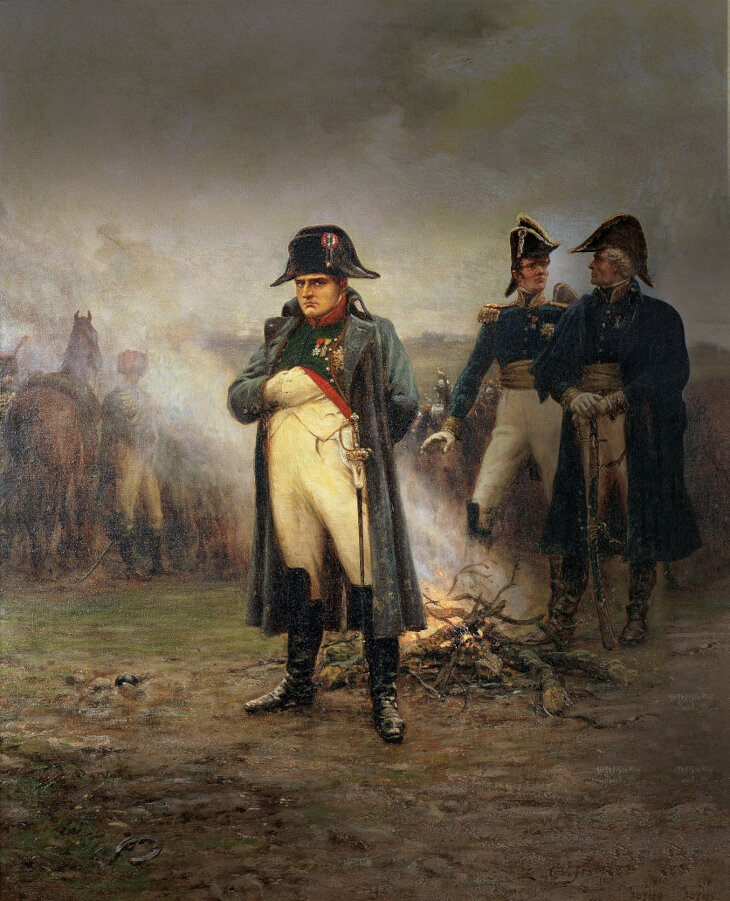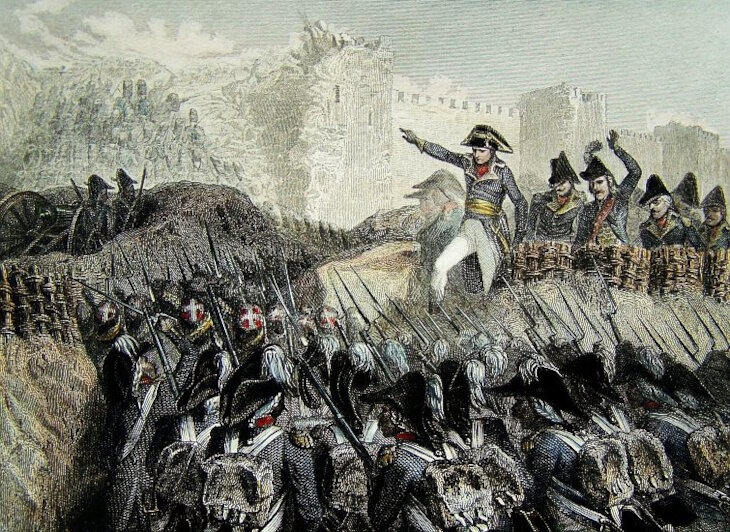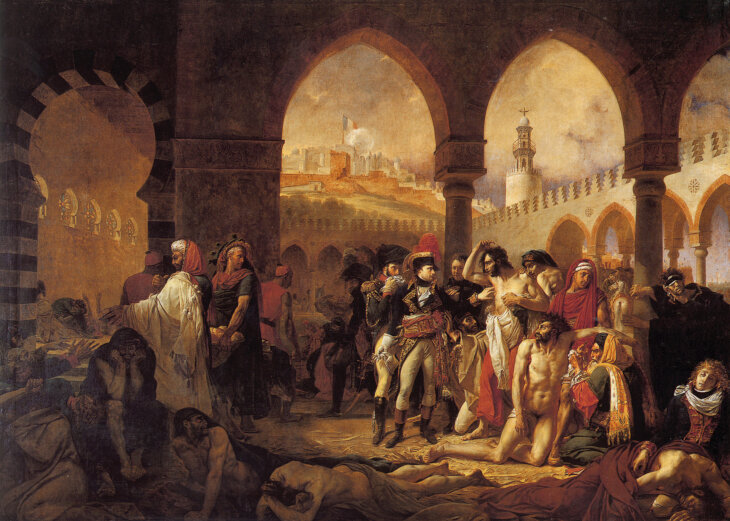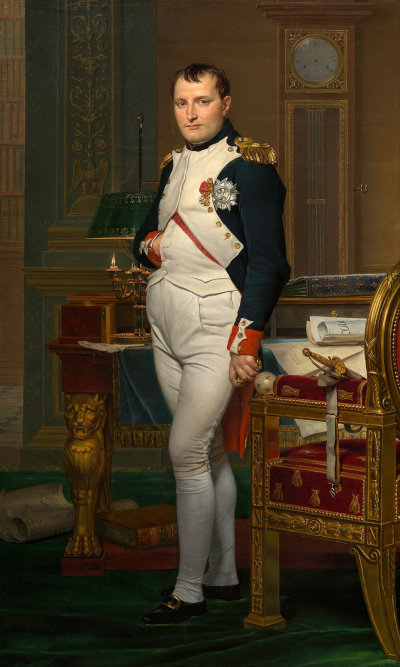 An Open Letter to University Presidents
An Open Letter to University Presidents


8 min read
The French emperor had a complicated relationship with the Jews.
The new Ridley Scott biopic “Napoleon” covers the dramatic rise and fall of the French monarch. Primarily focused on Napoleon's military campaigns and political career, the movie touches in passing on his intriguing and complex relationship with France's Jewish community.
If you were to go to a synagogue and ask a group of Jews in the 1800s their thoughts on the military leader, you’d hear conflicting opinions. Some would wax poetic on their praise for the emperor and be keen for adulation, citing his giving the Jews emancipation, even going as far as to call him “Ḥelek Tov,” meaning “Bona Parte” in Hebrew. Others reckoned him a ruthless tyrant forever tormenting the Jews for his sadistic pleasure.
Finding out who is more on target requires a dive into the history books to uncover the complex character that was Napoleon Bonaparte.
Our story begins in 1799, after several years of successful conquests and being one of the leading figures of the French Revolution. Napoleon was coronated as the emperor of the French Republic.
 A portrait of Napoleon Bonaparte by Ernest Crofts.
A portrait of Napoleon Bonaparte by Ernest Crofts.
While the French Revolution may have liberated the Jews and granted them emancipation at a time when, in the rest of Europe, Jews were persecuted mercilessly, Jews were still not assimilated into French society at large. Napoleon changed that. Throughout his conquests, he would spread the revolutionary ideas of equality before the law and Freedom of Religion.
Napoleon is quoted to have said: “It is my wish that the Jews be treated like brothers as if we were all part of Judaism… I thought that this would bring to France many riches because the Jews are numerous, and they would come in large numbers to our country where they would enjoy more privileges than in any other nation.”
Napoleon’s victorious armies brought emancipation to the Jews in all the countries of Central and Western Europe, where governments dependent on him were formed.
Throughout his conquests of Europe, Napoleon brought his modernist ideology with him. When he reached Italy, he was disgusted by the treatment of Jews as second-class citizens, being pent up in ghettos and segregated from the rest of society, as well as being identified with armbands with the star of David. He ordered to close the ghettos immediately, allowing Jews to live freely and practice Judaism openly. Napoleon also closed the ghettos in Rome and liberated the Jews of Venice, Verona, and Padua.
As emperor, Napoleon helped establish the Assembly of Jewish Notables and the (French) Sanhedrin. Whose goals were to separate “the political from the religious elements in Judaism.”
Following Napoleon’s conquest of Egypt in 1798, Napoleon embarked on campaigns through Palestine. With over 13,000 soldiers, he set out toward Israel with little time to prepare, as the mission’s success relied on the element of surprise. Within four days, Napoleon’s armies were well within the Sinai Peninsula, and just a few days later, Napoleon had captured El Arish and Gaza. Ashdod and Ramla soon followed. Napoleon was sure he had a grip on the region and had all but made it to Jerusalem, with all the religious and historical significance that entailed.
 Siege of Acre, 1799
Siege of Acre, 1799
In May 1799, during Napoleon’s military campaign in Palestine, rumors began to swirl that Napoleon planned to grant the Jews the right to return to their homeland. Many European newspapers published similar rumors, conveying the first ounce of hope to return to the promised land in centuries. But as these rumors were circulating, Napoleon’s stranglehold on the region began to weaken. The Ottoman forces were fighting back. Ultimately, Napoleon was forced to retreat from Acre due to a few poor tactical decisions and the plague, claiming thousands of French soldiers.
Today, the legitimacy of Napoleon’s declaration to the Jews to return to the Land of Israel is under question, and it’s a mystery whether Napoleon actually issued such a declaration at all, which only serves to make Napoleon’s relations with the Jews even murkier.
Napoleon also had detractors in the Jewish community. Some felt that Napoleon's motivations weren’t as altruistic as they seemed. They claimed he mainly saw the Jews as a useful tool to advance his political ambitions.
 Bonaparte Visiting the Plague-Stricken in Jaffa, by Antoine-Jean Gros, 1804
Bonaparte Visiting the Plague-Stricken in Jaffa, by Antoine-Jean Gros, 1804
In a letter to Champagny, the minister of the interior, his true motivations seem clear: “[It is necessary to] reduce, if not destroy, the tendency of Jewish people to practice a very great number of activities that are harmful to civilization and to public order in society in all the countries of the world. It is necessary to stop the harm by preventing it; to prevent it, it is necessary to change the Jews. [...] Once part of their youth will take its place in our armies, they will cease to have Jewish interests and sentiments; their interests and sentiments will be French.”
It seems Napoleon’s chief goal was to erase the Jewish identity of Jews and make them first and foremost Frenchmen.
Martin Buber explored European Jewry’s experience with Napoleon Bonaparte in his seminal work "For the Sake of Heaven." Buber saw Napoleon as a polarizing figure for Jews, making promises he couldn’t keep and treating the Jews fairly but at the same time erasing elements of the Jewish identity.
Rabbi Berel Wein claimed that Napoleon’s true interest was in seeing the Jews assimilate rather than prosper as a distinct community: "Napoleon's outward tolerance and fairness toward Jews was actually based upon his grand plan to have them disappear entirely by means of total assimilation, intermarriage, and conversion," he writes.
 The Emperor Napoleon in His Study at the Tuileries, Jacques-Louis David, 1812
The Emperor Napoleon in His Study at the Tuileries, Jacques-Louis David, 1812
Irrespective of the motives, emancipation opened up doors for Jews to abandon traditional insular roles and enter French society in new ways. Some became prominent bankers, politicians, academics, and army officers. This made France one of the most tolerant countries in Europe for Jews to live.
However, Napoleon's relationship with Jews grew more antagonistic later in his reign. As his military losses mounted, Napoleon partly blamed the Jews for his misfortunes. He harshly condemned Jewish moneylenders he felt were cheating French peasants. The emperor also limited Jewish rights in some industries and imposed restrictions on money lending and trade for Jews.
French historian Patrice Gueniffey, who wrote “Bonaparte: 1769-1802,” explains that within Napoleon “was a side of monstrousness and madness. He never knew when to stop, which led to his downfall.”
Historian Richard Ayoun has stated that Napoleon “despised the Jews,” and merely used them for his own projects. Ayoun cites remarks made by Napoleon in 1817 during his exile in Saint Helena to General Gourgaud: “The Jews are a nasty people, cowardly and cruel.” Critics of the French monarch cite the letter to his brother in 1808, where he called Jews the “most contemptible of people.”
Things took a turn for the worse in 1808 when Napoleon issued an order restricting the economic activity and freedom of movement of the Jews in certain provinces of the empire for ten years. This order became known amongst Jews as the “Infamous Decree.” This decree also required Jews to adopt formal names with which they would be addressed.
According to some, this was only done to appease Tsar Alexander I of Russia as a temporary measure. But the damage had been done.
Historian Ben Weider argued that Napoleon had to be extremely careful in defending oppressed minorities such as Jews, in order to keep balance with other political interests. He believes that the leader saw political benefit to his Empire in the long term in supporting the Jews specifically.
This uneasy dynamic continued until Napoleon's final exile after Waterloo in 1815. After the Coalition had risen to power many of the discriminatory measures were restored.
The contentious emperor's complex relationship with Jews mirrored the momentous changes underway in Europe. By promoting Jewish emancipation, he highlighted the difficulties of assimilating into secular society. Napoleon's Jewish policies embodied the paradoxes of the Enlightenment era. New principles of citizenship existed alongside lingering religious bigotry and conspiratorial views of Jews.
Napoleon’s short but significant reign as emperor was erratic, tyrannical and despotic at times. It reflected the hesitant transition toward religious tolerance and inclusive nationalism that still had far to go. But he took some bold first steps, however imperfect, that began a long road of Jewish acceptance in France and beyond. Two centuries later, the Napoleonic age remains a pivotal chapter in the Jewish story.

I really enjoyed reading your article. Thanks for posting.
Teri
Atlas Biomechanics
Was there any time in history that the Jews flourished “under” any leader? The
very term suggests the ultimate outcome! May the Mashiach come speedily in our time!!!!-
I have a Rumanian ancestor, Jewish, known as "Frechie" who was Napoleon'sr personal translator, fluent in 7 languages
The book EMANCIPATION by Michael Goldfarb discusses how liberating Europe’s Jews from the ghetto led to revolution and the Renaissance.
The pattern of initial friendliness and subsequent loathing is not unique to Napoleon. We see it in Martin Luther, in Muhammad, in Jimmy Carter - in every case where people have specific expectations of the Jews which the Jews don’t fulfill. Such expectations are usually based on wishful thinking and the person’s own agenda and rarely take into account who and what the Jews actually are.
Indeed! We'd be so much better off if we'd stop worrying about what others think of us.
Jew haters, in particular, refuse to acknowledge all the good we do and prefer to swallow the lies infused within Arab or any other antisemitic propaganda instead. We shouldn't doubt that they'll all get their just desserts; may it be soon!
In the meantime, to merit the ultimate justice that only Hashem can provide, let's instead be concerned with what He thinks of us!
Please contav5t your local chabad emissary to learn about the Labavitcher Rebbe and Napoleon.
There is a brilliant film script called Leticia about napoleon s mother by the Jewish writer Alfred Kerr. The sale of this script to Alexander Korda enabled the kerr family to get to England at the end of 1935. The film has yet to be made and the script is excellent. I have it and the kerr archive has it.
Please contact your local Chabad emissary to learn about the Lubavitcher Rebbe and Napoleon. Steve Finer